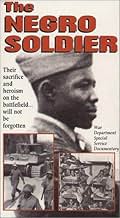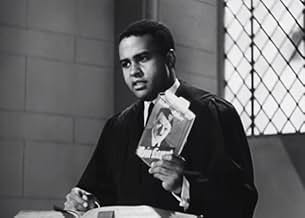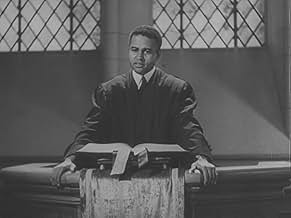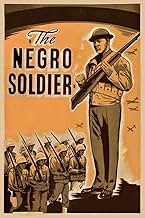Documentary focusing on the contributions to the American war effort of African-American soldiers.Documentary focusing on the contributions to the American war effort of African-American soldiers.Documentary focusing on the contributions to the American war effort of African-American soldiers.
- Awards
- 2 wins total
Max Schmeling
- Self
- (archive footage)
Henry Johnson
- Self - WW1 Soldier
- (archive footage)
George Washington Carver
- Self - Chemist of Agriculture
- (archive footage)
James S. Watson
- Self - Elected Judge in New York City Courts
- (archive footage)
- (as Elected Judge in New York City Courts)
Matthew Henson
- Self - Explorer
- (archive footage)
- (as Explorer)
Vivien Theodore Thomas
- Self - Leading New York City Surgeon
- (archive footage)
- (as Leading New York City Surgeon)
W.C. Handy
- Self - Father of the Blues
- (archive footage)
- (as Father of the Blues)
C.B. Powell
- Self - Financier and Publisher
- (archive footage)
- (as Financier and Publisher)
Gertrude Elise Ayer
- Self - Principal of a New York City Public School
- (archive footage)
- (as Principal of a New York City Public School)
Lawrence Reddick
- Self - Curator, Schomburg Collection of Literature
- (archive footage)
- (as Curator)
Richmond Barthé
- Self - International Prize Winning Sculptor
- (archive footage)
- (as International Prize Winning Sculptor)
Marian Anderson
- Self - Singer
- (archive footage)
- (as Singer)
Jesse Owens
- Self - Sprinter at the 1936 Summer Olympics Final
- (archive footage)
- (as Owens)
Erich Borchmeyer
- Self - Sprinter at the 1936 Summer Olympics Final
- (archive footage)
- (as Borchmeyer)
Ralph Metcalfe
- Self - Sprinter at the 1936 Summer Olympics Final
- (archive footage)
- (as Metcalfe)
Martinus Osendarp
- Self - Sprinter at the 1936 Summer Olympics Final
- (archive footage)
- (as Osendarp)
Gustav Weinkötz
- Self - High Jumper at the 1936 Summer Olympics Final
- (archive footage)
- (as Weinkötz)
- Director
- Writer
- All cast & crew
- Production, box office & more at IMDbPro
6.0874
1
2
3
4
5
6
7
8
9
10
Featured reviews
Propaganda
As all "good" propaganda this also is telling the truth. Well part of it at least. Omissing crucial other things that may not serve the purpose the movie/documentary had in mind. Because this was about recruiting people of color to the military. So you know, they only tell the people the good stuff, not the things that were still dividing America. It's almost tragic, but some of the things dividing are still very apparent (especially with number 45 in power).
You may say, why go to current politics? The question should not be raised, because while there is no commentary at hand (at least not with Netflix), this is a testament to a part of history some like to forget. And how devious methods were applied to benefit an army, pretending to be more than it was ...
You may say, why go to current politics? The question should not be raised, because while there is no commentary at hand (at least not with Netflix), this is a testament to a part of history some like to forget. And how devious methods were applied to benefit an army, pretending to be more than it was ...
Well-made propaganda film
A US World War 2 propaganda film, showing how African-American soldiers are helping the Allied cause.
A well-made propaganda film. Quite stirring in showing the contribution African-Americans had made to previous wars and were making to the current war, World War 2. Made to convince African-Americans to join up and help win the war it does well to paper over the race-based social divide that existed in the US at the time.
Quite sad in the respect in that, while it was okay for African-Americans to fight and die for their country, they were treated as second class citizens at home, with less rights than whites. Just the fact that the film had to be made is a sad reflection of the times.
This said, it is very effective in its purpose and is even quite emotional at times. Some good military footage too.
A well-made propaganda film. Quite stirring in showing the contribution African-Americans had made to previous wars and were making to the current war, World War 2. Made to convince African-Americans to join up and help win the war it does well to paper over the race-based social divide that existed in the US at the time.
Quite sad in the respect in that, while it was okay for African-Americans to fight and die for their country, they were treated as second class citizens at home, with less rights than whites. Just the fact that the film had to be made is a sad reflection of the times.
This said, it is very effective in its purpose and is even quite emotional at times. Some good military footage too.
True Propaganda Treasure from the Department of Defense
This production was made in partnership with the then called Department of War. The goal of this film was to recruit African-Americans to join the war effort in WWII. The film tries to convince blacks that the U.S. has always had an amicable relationship with them. The film offers happy imagery of blacks building log cabins beside the early settlers and working pleasantly beside whites in factories. However, never does the film try to explain or apologize for slavery. The film also suggests that blacks have always had the same opportunities as whites. In this film, slavery, lynchings and inequality are simply erased. For this reason, this film is a true treasure for the propaganda film archive.
Reaching Out to the Black Community
The Negro Soldier (1944)
** 1/2 (out of 4)
Mildly entertaining documentary from the War Department, which was made to try and get more black people to join the military. Many of these WWII documentaries were directed by people like Frank Capra and John Huston but this one here comes from Stuant Heslier who got the job at William Wyler quit the project thinking that the documentary was too fake for its own good.
If you recently viewed this film on Turner Classic Movies then you probably saw the introduction with author Mark Harris. If not, his book "Five Came Back: A Story of Hollywood and the Second World War" has some information about this film. From Harris, the War Department feared that black people weren't going to join the Army because there were reports out there that their lives might be better if the United States lost the war. When viewing this film it's obvious the see that the "truth" was being left out and especially since this film tries to make it seem like black people were "free" during 1944.
Of course, we know that a lot of hard times laid ahead but, as Harris states, it's important to remember that this film was made during wartime and the War Department needed people to join. The documentary features Joe Louis as someone doing it "right" and there's a lot of footage from the Olympics that were held in Germany where Jesse Owens shined. The film also talks about Hitler wanting to destroy black people and their freedom. There's a lot of interesting stuff going on here and the film is certainly entertaining but there's just too much missing or covered up for it to be a complete entertainment.
** 1/2 (out of 4)
Mildly entertaining documentary from the War Department, which was made to try and get more black people to join the military. Many of these WWII documentaries were directed by people like Frank Capra and John Huston but this one here comes from Stuant Heslier who got the job at William Wyler quit the project thinking that the documentary was too fake for its own good.
If you recently viewed this film on Turner Classic Movies then you probably saw the introduction with author Mark Harris. If not, his book "Five Came Back: A Story of Hollywood and the Second World War" has some information about this film. From Harris, the War Department feared that black people weren't going to join the Army because there were reports out there that their lives might be better if the United States lost the war. When viewing this film it's obvious the see that the "truth" was being left out and especially since this film tries to make it seem like black people were "free" during 1944.
Of course, we know that a lot of hard times laid ahead but, as Harris states, it's important to remember that this film was made during wartime and the War Department needed people to join. The documentary features Joe Louis as someone doing it "right" and there's a lot of footage from the Olympics that were held in Germany where Jesse Owens shined. The film also talks about Hitler wanting to destroy black people and their freedom. There's a lot of interesting stuff going on here and the film is certainly entertaining but there's just too much missing or covered up for it to be a complete entertainment.
8sbox
Made When Patriotism Wasn't Corny
This is a good patriotic documentary which focuses on blacks' role in World War II. Made in 1944, this film includes many interesting scenes, from training to actual service.
Did you know
- TriviaIn 2011, the film was selected for preservation in the National Film Registry by the Library of Congress with the following statement: "'The Negro Soldier' showcased the contributions of blacks to American society and their heroism in the nation's wars, portraying them in a dignified, realistic, and far less stereotypical manner than they had been depicted in previous Hollywood films."
- Alternate versionsAccording to government documents, a two-reel shortened version of the film was released in July 1944.
- ConnectionsEdited from America (1924)
Details
- Release date
- Country of origin
- Language
- Also known as
- The Negro Soldier in World War II
- Production companies
- See more company credits at IMDbPro
Box office
- Budget
- $78,254 (estimated)
- Runtime
- 43m
- Color
- Sound mix
- Aspect ratio
- 1.37 : 1
Contribute to this page
Suggest an edit or add missing content





























